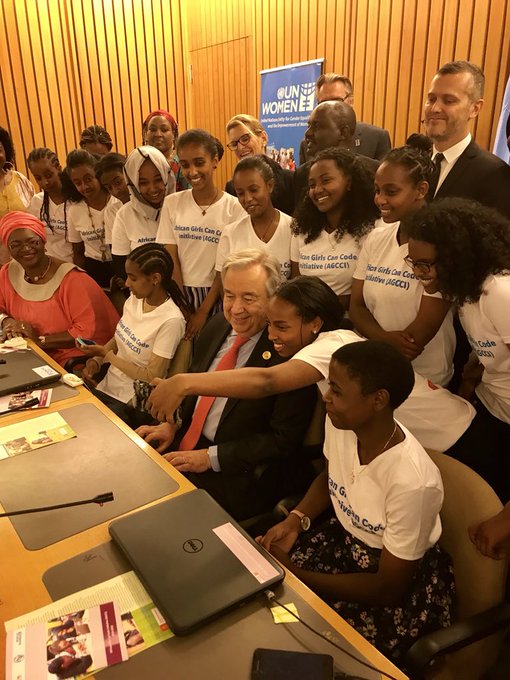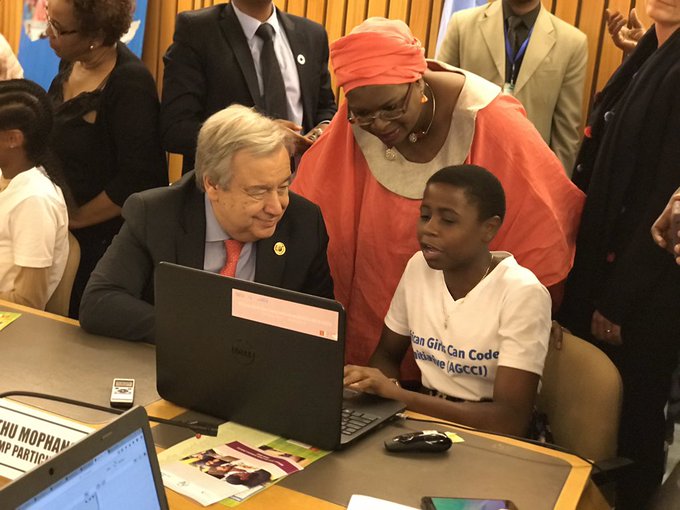
6 stories that show inclusion is key to supporting women and girls in STEM
Science, technology, engineering and math (STEM) education can spark tech innovations that impact our daily lives.
However, a significant gender gap persists in STEM fields all over the world. The United Nations has called for women and girls’ full and equal participation in science and technology innovation, and ITU plays a key role fostering their inclusion in technical fields.
Here are six stories showing that inclusion of women and girls is key to innovation:
Laboratoria: Training women to design the world’s future
Last year, Laboratoria won the EQUALS in Tech Award for their work to train thousands of women across Latin America with technical skills. These coding skills open up opportunities for women to join the workforce and ensure that our technologies empower both men and women.
Watch her TedX Talk below, and read how one woman went from selling tortillas to front-end engineering and how the programme helps women take control of technologies and their careers.
Girls in ICT Day: Inspiring the innovators of tomorrow
ITU is the leader for the International Girls in Information and Communication Technology (ICT) Day. This is the global day to inspire and equip girls with skills that can change their lives.
ITU also leads International Girls in ICT Day, which is celebrated worldwide every year on the 4th Thursday of April. With the support of Member States, International Girls in ICT Day aims to inspire girls and young women to learn more about the benefits of technology and consider careers in this sector. This year, International Girls in ICT Day will be celebrated on 25 April in Addis Ababa.
To date, over 357,000 girls and young women have taken part in more than 11,000 celebrations of International Girls in ICT Day in 171 countries worldwide. This initiative has proven that inclusion is key to getting more girls interested in technical fields.
For example, last year at ITU Headquarters in Geneva, over 100 girls learned to programme robots, write code and experiment with IoT wearable bracelets.

At NASA’s Glenn Research Centre, local girls took part in ‘hands-on learning missions’ with 3D printers and embarked on virtual reality tours of the International Space Station.
If you want to join or plan your own Girls in ICT Day event, visit the website for resources, handbooks, games and other great ideas to get girls excited to innovate.
African Girls Can Code
The African Girls Can Code Initiative is a four-year project led by ITU, the African Union Commission (AUC), and UN Women Ethiopia. It is bringing together girls and young women from all over the African continent spark their interest in ICT as a career path.
The first camp with 120 Girls participating was held in Addis Ababa, Ethiopia last August.
On 10 February, a special dialogue with UN Secretary-General António Guterres and the participants of the first coding camp of the African Girls Can Code Initiative was held in Addis Ababa, on the sidelines of the African Union Summit.
António Guterres ( Twitter post) : “I enjoyed meeting these impressive students in Ethiopia and learning about their innovative coding projects. Keep up the good work!”
The initiative also plans to execute activities to mainstream ICTs and Gender into the national school curricula of African countries and to establish and maintain an online platform where girls participating in the camps and others can interact with Inspirational Women and other Mentors, and have access to learning materials and comprehensive information on existing ICT and Tech clubs, companies and institutions.
First Iranian woman in space aims for the stars
Anousheh Ansari has earned a place in history as the first female tourist to visit space and the first astronaut of Iranian descent. She is also the first Muslim woman to exit Earth’s atmosphere.

She is now the CEO of XPRIZE and is a mentor for women around the world who want to expand their horizons and aim for the stars.
Watch a video where she discusses breaking gender barriers in space, and be sure to register for the AI for Good Global Summit to see her speak at ITU in Geneva in May 2019.
From makers to changemakers: Community education supporting ‘green inventors’
Using reused materials from their communities, children in a rural area of Andhra Pradesh, India, learn to carry out projects to invent new and amazing things. These girls benefitted from hands-on workshops in a ‘maker space’ of Project Design Education For Yourself (DEFY) within the framework of Inventors4Change project.

The project received global recognition as a World Summit on the Information Society (WSIS) Photo Contest Winner in 2018. View all of the amazing photos here.
Working to advance STEM education for African women
Across Africa, women and girls are benefiting from STEM camps that are organized by the Working to Advance STEM Education for African Women Foundation (WAAW).

Unoma Okorafor, the founder of WAAW Foundation, believes that learning science and tech should be fun. Which is why they engage girls with creative projects to spark their interest in STEM subjects. The initiative has received numerous awards for their approach and they have been nominated as one of the WSIS Prizes 2019 finalists for capacity building.
Have you read? Top 5 ways to get more women and girls into STEM


